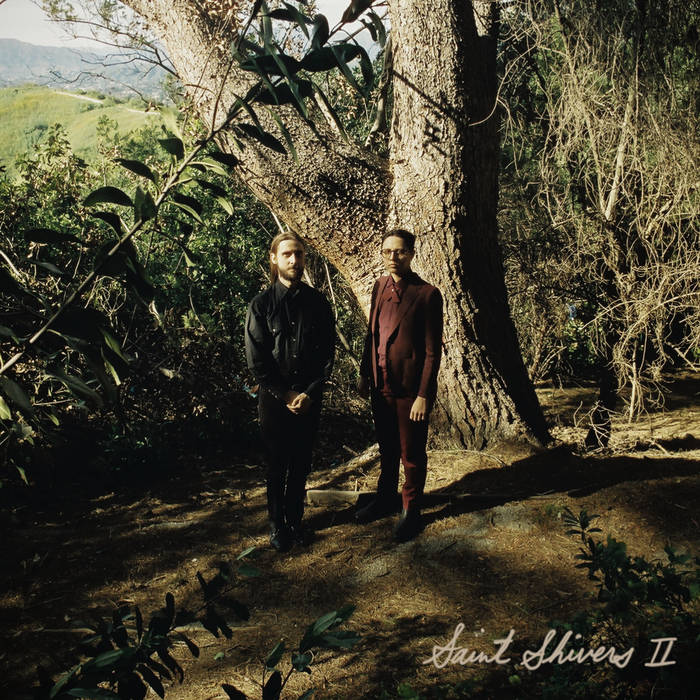FORTHE’S BANDCAMP PICKS: WINTER/SPRING 2023
17 minute readMusicians have been getting screwed over by shady business deals as long as there’s been a music industry. The modern way of doing so is of course receiving little-to-no compensation for online streaming. Apps like Spotify generally only pay between $.003 and $.005 per stream, according to Business Insider.
Any day of the year, one of the best ways to help an indie musician is through Bandcamp and on Bandcamp Fridays, artists receive an average of 93% of the proceeds of the sales of their music! (On all other days they still receive an average of 82%.) If you can’t do it this month, fear not, you can participate in a future Bandcamp Friday, which will continue to be held every first Friday of the month in 2023, with the exception of June and July. The importance of supporting local artists and musicians cannot be stressed enough. Buy independent music!
In this edition, editors Erin Foley and Jasmine Navarro are featuring new works by Long Beach standouts Soular System, Saint Shivers, Malila, and Human Musik, as well as a playlist of recordings released between February – May 2023 by other local artists.
In a city as abundant with talent as Long Beach is, there is no way this is a comprehensive list! We are sure there are many other recordings released in this time frame not listed here. If you know of any fabulous new local releases, as always, please send them our way via erin@forthe.org.
Malila – Time Untouched

Released Feb 1
For Malila Hollow-Gonzalez, a classically trained pianist and vocalist that graduated from the Bob Cole Conservatory at California State University Long Beach, the isolation of the pandemic created space for her to focus on songwriting. From the tragic passing of a friend to grappling with personal health issues, there was a lot to process and not much to do other than to run and to play music. Before she knew it, she had an album’s worth of lyrics. She told me, “Spirit was coming out!”
It finally felt like the right time to go ahead and record the album she dreamed of, one that was personal and done exactly how she wanted. During this time she was also having sudden bouts of tinnitus and vertigo and other vestibular issues she had never experienced before. After getting a bunch of “weird [medical] tests” to understand why, she was diagnosed with Ménière’s disease. She was shocked to learn that what she was experiencing was related to a genetic disease that could even lead to permanent hearing loss in the affected ear.
“Nobody expects that to happen to them… I was depressed,” Malila told me, “Ultimately I decided I need to play as much as possible for as long as I can. Because I don’t know what it’s gonna be like if I lose half my hearing.”
At times she was scared it was already too late. She kept having flare-ups. But when it would come time to record, even if she had been suffering the night before, she would “magically” be okay when it was time to record.
Her rapport with producer Antoine Arvizu of The Compound Studio was another good omen. She was grateful that he gave her space to do her thing but was always there to guide her if she needed him. She “appreciated his professionalism” but also says they connected on multiple levels, including on their Indigenous ancestry. “We were cracking jokes and talking about ceremony… I think that it just all felt really right to me to record there.”
With elements of classical music, jazz, and adult pop music, Time Untouched is a lush and soothing piano driven album that also has acoustic and electric guitar by Miles Jensen, bass guitar and upright bass by her hubby Nicolas Gonzalez, as well as trumpet (Nic Chaffee), saxophone (Robbie Covacevich) and drums (Antoine Arvizu, John Miranda, Jackie Rush). Its lyrics explore pain, mortality, and personal growth. The opening song “Sweet Lovely Day” also touches on Malila’s spirituality as an Indigenous woman. Referring to the sacred grounds of the local Tongva and Acjachemen people she said, “I definitely had Puvungna in my heart and my brain.”
(Speaking of her brain, Malila is also happy to report that she has not had a flare-up in nine months!)
Catch Malila live at her “album celebration” on June 17 at Los Alamitos Premiere Dance & Arts. Kurt Sanchez will be opening at 7 pm, Malila’s band will play around 8. There will be food & beverages served. You can also catch her live on June 25 at Ficklewood Ciderworks in Downtown Long Beach and June 28 at Vine on 4th St./Retro Row.
– EF
Soular System – Down the Road

Released March 10
Though their live show could have anywhere from two to twelve musicians on stage playing a range of instruments, ultimately the core of Soular System is Anthony Lynn (vocalist) and Tom Kendall (drums, production). Both from multigenerational Long Beach families, the duo met at Poly HS when Lynn was singing in a jazz vocal group that Kendall accompanied on drums. Soon they were writing songs together.
“It was just super natural, it flowed really well, made a lot of sense and was a lot of fun,” Kendall says. Their first album Summer Solstice was recorded in 2016. They have been writing and performing music together ever since, but they also spent most of last year apart while Kendall was away on a gig. (He was on tour working behind the scenes as a music director.) When the two came back together earlier this year, songs organically started pouring out per usual. Within two to three weeks they had all four songs for the EP written.
Whole life ahead of you
So whatcha gonna do about it
I see the way you move
And you’ve been runnin circles round it
The first two songs (“Holaifahedayu,” “Rebound”) feel motivational and inspiring without venturing into the realm of cheesiness. The vibe is too smooth! The last two songs (“Heartbeat,” “Down the Road”) both refer to the loss of a formative relationship. Although there is sadness and longing conveyed, there is also a feeling of things being open-ended… perhaps they will see what happens “Down the Road.” There is a sense of just flowing with life’s cycles, just keeping it moving.
Fun fact: The opening track has Anthony repeating “whole life ahead of you” to the point that it felt like one long non-English word to him, which is how the title became “Holaifahedayu.”
Harpist Gracie Spout is the only other person with a songwriting credit on the album. An accomplished musician that happens to be married to Kendall and can often be found accompanying songstress Jhene Aiko, Sprout adds a moody yet ethereal air on the romantic earworm “Heartbeat.” I had the whole EP on repeat for days. It keeps living rent-free in my head and I am not mad about it.
Catch Soular System live on May 27 at the Edison Theatre headlining a show called Long Beach Uncovered that includes Nebulaz Beach as well as Dawn Koyote and The Black Noise Theory. Also on the horizon is an exciting Soular System + Seafood Sam collaboration that was executive produced by Kendall. Stay tuned for the release date!
– EF
Saint Shivers – II

Released May 1
You may recognize Kelsey Landazuri (they/them) as the drummer in local band Slice, who was featured in a previous Bandcamp Round-Up. In Saint Shivers, Landazuri comes out from behind the drums to play guitar and take lead on songwriting and vocals. Coming together about five years ago, friends Brian Newhard and Michael Williams (on drums and bass, respectively) round out the band.
This is Saint Shivers’ second album together. Both albums have evidence of early Americana influences like blues and folk, but in II they are rocking out a whole helluva lot more. The album shows an exciting range—it almost feels like every era of Bob Dylan wrapped up in one (with vocals especially reminiscent of his Blood on the Tracks album), yet there is no mistaking Landazuri ’s special stamp on it.
“It’s more experimental,” Landazuri says, “we get a little more rocking and almost psychedelic in places with the pedals and effects.”
Landazuri’s favorite song on the album is the dynamic “House of My Father” which has a breakaway guitar solo that they say is “really fun to play.” Though not a religious person, they enjoy using religious symbolism for effect and the song ends with a dramatic narration by Landazuri. Listeners are left with the question, “God, why have I been forsaken?”
Noting that most of their friends have told them that “House of My Father” is also their favorite song on the album, Landazuri is still figuring out what possessed them to write such an epic tale, “I don’t even know, I’ve never written a song like that before, but I am glad I did.”
In true DIY fashion, Landazuri has their own recording equipment and handles just about everything in-house, except mastering the album which was done by Brian Frederick.
After a hiatus that lasted about a year (which is when the album was actually finished), it’s been a long time coming to get the album out to the public. Keep an eye out, Landazuri says they will start playing shows again this summer.
Plans are also already being made to a record a third EP. On the cover of Saint Shivers I, Landazuri is the only one pictured. On Saint Shivers II, Newhard and Landazuri are on the cover. Williams will finally join them to grace the cover of Saint Shivers III, which will be the last one in this series.
– EF
Human Musik– Plants

Released May 3
Last summer, Ali Abourehab started writing songs alone in his room. He had spent years contributing his talents to other bands, but this time was dedicated to writing something new of his own. Inspired by bands like Stereolab and Broadcast, as well as his deep roots in jazz and punk, he began writing punchy pop songs dripping in psychedelia.
Human Musik began as a concept, but quickly turned into a busy five-piece band. Friends filtered in and out for a bit like a collective, until the group settled into its present iteration: Abourehab (vocals/bass), Abby Anderson (vocals), Yan Smith (synth), Olivia Wissa (flute), and Jordan Hermosillo (drums/production). Despite being from the same tight-knit scene of DIY kids, the five members’ contributions pull from their diverse inspirations, creating a listening experience that is equal parts familiar and fresh.
Originally from Cairo, Egypt, Abourehab moved to Long Beach with his family in late 2016. At the time, he was tinkering with synthy hip-hop inspired beats that he frustratingly couldn’t seem to find lyrics to. When the pandemic hit, he found himself moving away from beat-making and gravitating towards figuring out his new analog synth. He transitioned into making ambient music and started learning bass.
After the world opened back up, Abourehab’s tastes shifted again. He started going out more and began meeting more people in the live music scene. Inspired, but not confident in his improvisation skills, he began bringing his synth to every hang session to practice jamming with others.
Jamming brought Ali in touch with the Plastic Horseshoes, record store owner Kevin “Dyzzy” Diehm’s band. “I played with the Horseshoes a little bit and that softened me up to being able to play in a band,” recalls Ali. “I actually started realizing how much more I enjoy that than just doing some sort of DJ gig or beat gig all by myself up there. I started really falling in love with being on stage with multiple people and feeling something together.”
Enamored with his taste of the Long Beach live music scene, Abourehab began joining other bands. He jammed on an ambient wave with Smith and their mutual friend Eden Vincent, although something was still missing. When Aman Patel joined their jam sessions as a drummer, Human Musik’s sister band Soundfrom was born.
While Ali was playing analog synth in the Horseshoes and Smooth Jas, he began playing bass in Soundfrom; It was Patel’s drumming that inspired him to switch to rhythm. “Playing with [Patel] got me so used to playing with drummers and doing fills together. I started really falling in love with bass, and I carried that into Human Musik… Bass was the instrument I wanted to be out there playing.”
Tomisin Oluwole
Fragmented Reflection I, 2021
Acrylic on canvas panel
24 x 30 inches
Click here to check out our interview with Tomisin Oluwole, a literary and visual artist based in Long Beach.

Instead of gunking up our site with ads, we use this space to display and promote the work of local artists.
Meanwhile, while playing in Smooth Jas, he was learning how to structure pop songs. Abourehab said, “Playing in that band gave me a way bigger perspective as to how to write a structured song… It helped a lot with my songwriting.”
With the inspiration and knowledge Ali gained from years of hard work in the live music scene, it is no wonder that Human Musik’s shows run like a well oiled machine. From their first performance on, the band has packed out local venues. After a busy summer of shows, Human Musik took a break to start recording. The result is their first single “Plants,” a swirling, hazy song about longing. Abby Anderson’s vocals float over the mix as she sings about the eerie space having a crush can leave us in:
if the plants could talk
they’d express their hearts with
honesty and modesty yet pride in their tone
they’d sing along to the moon and the stars
so it never really gets too dark.
Like the human experience, the song is vibrant and full of emotion. Smith’s synth and Wissa’s flute dance in harmony with each other, juxtaposing the urgency of the rhythm section. There’s a lot going on, but everything goes together just right.
– JN
CHECK OUT THESE OTHER LOCAL RELEASES
Hex Code – Hex Code
Released Feb 4
Breatherrr – “Tiger”Released
Released Apr 7
Sanguine Knight- Cause I’m In Love
Released Apr 19
Fellow Robot – “Poppy Fields”
Released Apr 21
Nebulaz Beach – “Canopy”
Released Apr 24
Ariel Carreño – It’s Not a Dream
Released Apr 24
Joel Jasper – “Blurry”
Released Apr 28
Decisive Koala – “DK Exclusive #2”
Released Apr 28
Soof – “Planets” ft. Dania
Released Apr 28
Various Artists – Ruff N Rugged Vol. 4
Released Apr 28
Soundfrom – “Drone Three”
Released May 3
Please send your suggestions for future features to erin@forthe.org.


 editors@forthe.org
editors@forthe.org




